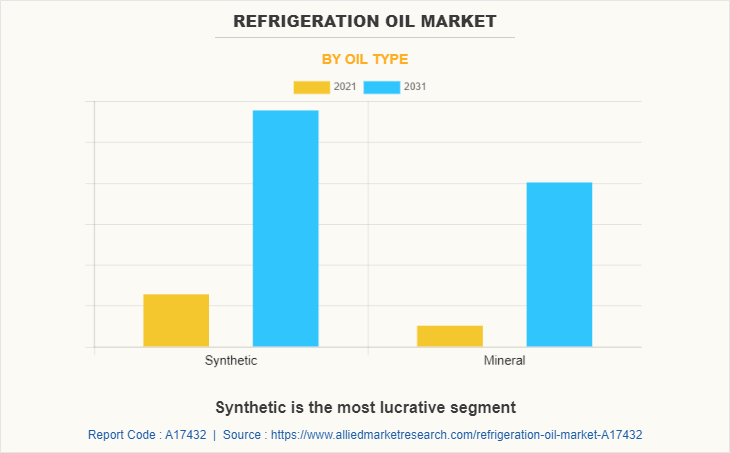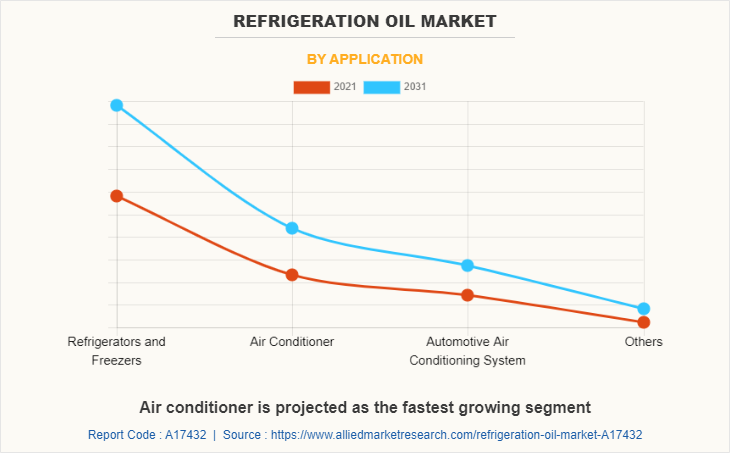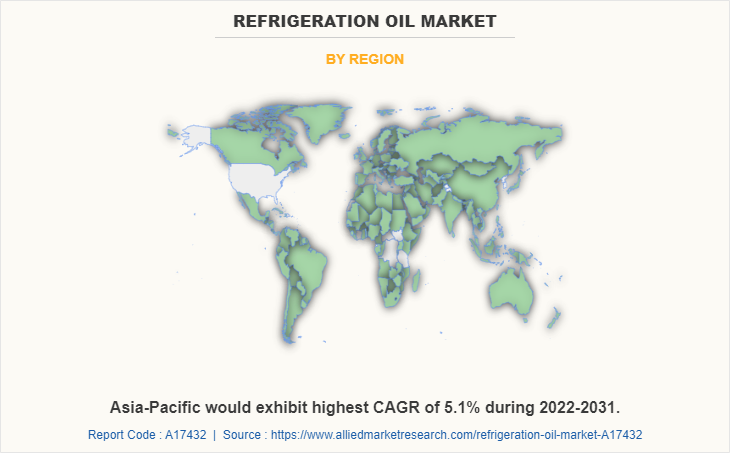Refrigeration Oil Market Size & Insights: 2031
The global refrigeration oil market size was valued at $1.4 billion in 2021, and is projected to reach $2.2 billion by 2031, growing at a CAGR of 4.7% from 2022 to 2031. Increase in demand for energy-efficient refrigeration systems and adoption of advanced refrigerants are key drivers for the growth of the refrigeration oil market. Energy efficiency has become a critical focus across industries to reduce operational costs and minimize environmental impact, leading to the development of innovative refrigeration systems that require high-performance oils for optimal functionality.
Introduction
Refrigeration oil is a specialized lubricant designed for use in refrigeration and air conditioning systems to ensure smooth operation, reduce wear and tear, and enhance the efficiency of compressors. It plays a critical role in maintaining the proper functioning of the system by reducing friction between moving parts, dissipating heat, and sealing gaps to prevent refrigerant leakage. Refrigeration oils are formulated to withstand extreme temperatures, resist chemical reactions with refrigerants, and provide long-term stability under varying operating conditions.

Market Dynamics
Paraffin-based mineral refrigeration oils are minimally miscible with ammonia refrigerant that further ensures and limits oil thinning and reduces oil carry-over in the compressors. Mineral-based refrigeration oils have low volatility, which further reduces oil consumption (fewer oil top-ups) and minimizes oil thinning from fractionation.
Lubrication of refrigeration compressor is utmost important and the efficiency of refrigeration compressor depends on type of refrigeration oils. Refrigeration compressors need to work under changing operating temperature that tend to increase the temperature of compressors. Thus, there is need for minimizing and dissipating heat from compressors. This in turn has escalated the demand for refrigeration oils that help to disintegrate heat away from compressor components, such as compression chambers and valves and help to assist sealing. This factor is anticipated to drive the growth of the global refrigeration oil market.
The compression temperature in refrigerates & freezers, air conditioner, and automotive air condition systems tend to reach peak temperatures of up to 180ºC. Thermal stability and chemical stability of refrigeration oil help to reduce the end compression temperature that further ensure proper working of air conditioners. In addition, growing environmental regulations has further created new opportunities for development of natural refrigeration oil, such as ammonia and carbon dioxide. This factor is anticipated to drive the growth of the global market during the forecast period.
Refrigeration oils are gaining importance and are being used in industrial heat pumps. Majorly, synthetic refrigeration oils are used in industrial compressors and heat pumps as they are capable of performing efficiently and effectively as compared to other conventional oils. In addition, synthetic refrigeration oils are compatible to be used with diverse refrigerants, such as carbon dioxide and ammonia. Industrial refrigeration compressors, heat pump, and low evaporators require use of oils that are proven to minimize the heat produced in these equipment. Refrigeration oils tend to reduce the heat, dissipate heat away from the equipment, improve lubricant oil life, and minimize shaft leakage. All these factors have increased the demand for refrigeration oil and thereby, is anticipated to drive the growth of the global market.
Refrigeration oils offer high thermal and oxidation stability that in turn improves shelf life of other industrial oil used in compressors. Moreover, compressors and other heat pumps require regular draining of oils and other refrigerants used.
However, oxidation capability of refrigeration oils minimizes drain intervals and routine maintenance cost. In addition, high viscosity index of refrigeration oil further minimizes fluid temperature that in turn helps to reduce the deposition of wax content on compressors and its associated parts, ensuring smooth working of the equipment and its parts. Minimal traction co-efficient factor is vital for ensuring improved system efficiency and reduced power consumption. Refrigeration oil has low traction co-efficient factor, making it widely used in compressors, which drives the growth of the global market. Some refrigeration oil poses environmental issues owing to need for periodic drain and replace the oil.
Thus, key-players in the refrigeration oil market are testing environment-friendly oils, intended to be used across industrial compressor. For instance, highly-refined mineral oil are type of refrigeration oils that are gaining importance over fossil-fuel-based refrigeration oils. All these factors drive the growth of the global market.
However, several environmental risks associated with use of refrigeration oils hamper the market growth. For instance, during disposal of used refrigeration oil, the risk of contamination associated with water bodies negatively impacts aquatic animals. In addition, emission risk associated with use of refrigeration oil also hampers the market growth. Refrigeration oils tend to cause ozone depletion and contribute to global warming. Refrigeration oils are mainly used in air conditioning and refrigeration systems. However, air conditioning and refrigeration systems tend to impact negatively on stratospheric ozone owing to use of ozone-depleting refrigerants. This further contributes towards global warming, owing release of refrigerants and from emission of greenhouse gases (GHGs) for associated energy use. All these factors tend to negatively impact the demand and use for refrigeration oil in air conditioning and refrigeration systems. This further tends to hamper the growth of the global market.
Conversely, refrigeration oils are gaining importance in the offshore industry. Refrigeration compressors are used extensively for process cooling, HVAC, and food preservation. Refrigerants are utmost important for efficient working of compressors.
However, growing legislative regulations over use of refrigerants requires proper use of refrigeration oil that ensures proper burning of these refrigerants. Mineral-based refrigeration oils offer chemical stability and thermal stability, making them ideal to be used in industrial compressor systems. In addition, low temperature property of mineral refrigeration oil, make them viable to be used in refrigeration systems and air condition systems that usually use fluorocarbon refrigerants. Gasoline production involves extensive production process and yields large a number of by-products. Mineral oil based refrigeration oil are formulated as a by-product during crude oil distillation process.
Thus, this type of refrigeration oil is a cost effective solution and thereby, the demand for mineral refrigeration oil is increasing. All these factors are anticipated to offer new growth opportunities. However, the demand for mineral refrigeration oil is gradually decreasing wherein the demand for synthetic refrigeration oils is growing steadily. Conventional refrigeration systems used CFCs and HCFCs refrigerants.
However, environmental regulations over use of these refrigerants have escalated the need and development of new refrigeration oil that are compatible with new refrigerants. Thus, key-players in the market are developing advanced and new synthetic refrigeration oil that are extracted or formulated from processed petroleum. Synthetic refrigeration oil-based on alkylbenzene, polyolester, polyalkylene glycol, and polyvinyl ether are gaining importance in the global market, which is anticipated to offer new growth opportunities.
Refrigeration oil market segmentation
The refrigeration oil market is segmented into oil type and application, and region. On the basis of oil type, the market is categorized into synthetic and mineral. By application, the market is segmented into refrigerators & freezers, air conditioner, automotive air conditioning system, and others. Region-wise, the market is studied across North America, Europe, Asia-Pacific, and LAMEA.

Refrigeration oil market by type,
In 2021, the synthetic segment was the largest revenue generator, and is anticipated to grow at a CAGR of 4.9% during the forecast period. High stability and low volatility of refrigeration oil significantly reduces the light end stripping drives the demand for synthetic refrigeration oil. Synthetic refrigeration oils help to form high oil film thickness on refrigerant that further helps to improve compressor protection, thereby extending the shelf life of the compressor. In addition, formation of thick oil film enables better shaft sealing, reduces fatigue on bearings, and minimizes maintenance cost of compressors parts. All these factors have escalated the demand for synthetic segment in the global refrigeration oil market.

Refrigeration oil market by application,
The refrigerators and freezers segment dominated the global market in 2021, and is anticipated to grow at a CAGR of 4.8% during forecast period. Oil thickness is crucial and determines efficiency of the compressors used in refrigerators and freezer. In addition, high oil thickness on compressor metal parts increases wear and tear thereby increases maintenance cost. Refrigerant oil also known as refrigeration oil is a high temperature formulation that is specifically designed and widely used to reduce formation of high oil thickness. This factor has escalated the demand for refrigeration oil in freezers and refrigerator compressors.

Refrigeration oil market by region,
The Asia-Pacific tetrahydrofuran market size is projected to grow at the highest CAGR during the forecast period. Refrigeration oils offer high thermal and oxidation stability that in turn improves shelf life of other industrial oil used in compressors. Moreover, refrigeration oil has low traction co-efficient factor, making it widely used in compressors, which drives the growth of the global market. Some refrigeration oil poses environmental issues owing to need for periodic need to drain and replace the oil. Thus, key-players in the refrigeration oil industry are testing environment-friendly oils, intended to be used across industrial compressor. For instance, highly-refined mineral oil are type of refrigeration oils that are gaining importance over fossil-fuel-based refrigeration oils. All these factors drive the growth of the refrigeration oil market in the Asia-Pacific region.
Competitive Analysis
The global refrigeration oil market profiles leading players, that include Exxon Mobil Corporation, HP Lubricants, Castrol Limited, Shell plc, ENEOS Corporation, ADDINOL, FUCHS, Phillips 66 Company, BP Lubricants Pvt. Ltd., Lubriplate Lubricants Company, Freudenberg Group, and Whitmore Manufacturing LLC. The global refrigeration oil market report provides in-depth competitive analysis as well as profiles of these major players.
Key Benefits For Stakeholders
- This report provides a quantitative analysis of the market segments, current trends, estimations, and dynamics of the refrigeration oil market analysis from 2021 to 2031 to identify the prevailing market opportunities.
- The market research is offered along with information related to key drivers, restraints, and refrigeration oil market opportunities.
- Porter's five forces analysis highlights the potency of buyers and suppliers to enable stakeholders make profit-oriented business decisions and strengthen their supplier-buyer network.
- In-depth analysis of the refrigeration oil market segmentation assists to determine the prevailing market opportunities.
- Major countries in each region are mapped according to their revenue contribution to the global market.
- Market player positioning facilitates benchmarking and provides a clear understanding of the present position of the refrigeration oil market players.
- The report includes the analysis of the regional as well as global refrigeration oil market trends, key players, market segments, application areas, and refrigeration oil market growth strategies.
Refrigeration Oil Market Report Highlights
| Aspects | Details |
| Market Size By 2031 | USD 2.2 billion |
| Growth Rate | CAGR of 4.7% |
| Forecast period | 2021 - 2031 |
| Report Pages | 274 |
| By Oil Type |
|
| By Application |
|
| By Region |
|
| Key Market Players | Idemitsu Kosan Co. Ltd, FUCHS Petrolub S, Cosmo Oil Lubricants Co., Ltd., Royal Dutch Shell Plc, Total Energies SE, BASF SE, Lukoil, Eneos Holdings Inc., Petrochemical Corporation of Singapore (Private) Limited., kluber, National Refrigerants, Inc., Johnson Controls International plc, Lubriplate Lubricants Company, EXXONMOBIL CORPORATION, Chevron Corporation |
Analyst Review
According to CXOs of major companies, the global refrigeration oil market is expected to exhibit high growth during the forecast period. Polyol ester (POE) refrigeration oil is widely used in refrigerators systems. In addition, POE refrigeration oil is compatible with HFC refrigerants.
Refrigeration oil is crucial and widely used in refrigerators to ensure proper lubrication of compressor that produces cold air. Other applications of refrigeration oil include, low temperature evaporators, marine refrigeration systems, and industrial heat pumps. Industrial refrigeration compressors use ammonia as refrigerating fluid. Use of refrigeration oil along with ammonia ensures high performance of these industrial refrigeration compressors. Polyalphaolefin (PAO) and synthetic alkylbenzene refrigeration oils offer resistance to thermal/oxidative degradation, making them viable to be used with low temperature evaporators and marine refrigeration systems.
Marine refrigeration systems face sludge and deposit formation that further escalates the risk of valve or filter plugging. Refrigeration oil tend to minimize sludge and wax deposit formation, thereby minimizing valve or filter plugging in the marine refrigeration systems. Mineral naphthenic oils are substitute products used in industrial heat pumps. However, high pour point of these naphthenic oils increases evaporator temperature, thereby requiring regular draining of burnt oil. However, the use refrigeration oil is gaining importance over naphthenic-based oil as refrigeration oil tend to have low pour point. In addition, refrigeration oils are compatible to be used with sealants and other mineral lubricant that further reduces risk of oil leakage.
Refrigeration oils are gaining importance and are being used in industrial heat pumps. Majorly, synthetic refrigeration oils are used in industrial compressors and heat pumps as they are capable of performing efficiently and effectively as compared to other conventional oils.
The refrigerators and freezers segment dominated the global market in 2021, and is anticipated to grow at a CAGR of 4.8% during forecast period.
Asia-Pacific is the largest regional market in the global refrigeration oil market in 2021.
The global refrigeration oil market is projected to reach $2.2 billion by 2031, growing at a CAGR of 4.7% from 2022 to 2031.
The global refrigeration oil market profiles leading players, that include Exxon Mobil Corporation, HP Lubricants, Castrol Limited, Shell plc, ENEOS Corporation, ADDINOL, FUCHS, Phillips 66 Company, BP Lubricants Pvt. Ltd., Lubriplate Lubricants Company, Freudenberg Group, and Whitmore Manufacturing LLC.
Loading Table Of Content...



